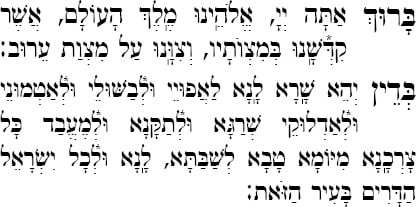 The Three Day Yom Tov. No other words strike as much fear into the Jewish mother. (Other than Three-day Yom Tov on Pesach. If you're not going to a hotel.) Three day Yom Tov's demand preparation, and lots of it, for the seven meals that will ensue over the course of the holiday. What to prepare? Who's got all that time?
The Three Day Yom Tov. No other words strike as much fear into the Jewish mother. (Other than Three-day Yom Tov on Pesach. If you're not going to a hotel.) Three day Yom Tov's demand preparation, and lots of it, for the seven meals that will ensue over the course of the holiday. What to prepare? Who's got all that time?Actually, a three day Yom Tov requires that one make an "eruv tavshillin" in order to permit preparation of the food on Friday for Shabbat. What's an Eruv Tavshillin? I'm glad you asked.
While we refrain from forbidden melachah (forms of work) on Yom Tov (holidays) Jewish law permits acts of cooking on holidays. Yet, while I can cook for a particular day of Yom Tov, Halachah prohibits preparing from one day of Yom Tov to another. So, despite the fact that I can cook on Thursday Yom Tov to eat that day, I cannot therefore cook a large pot of pasta to send with my kids to school the next day - or even to eat on Friday, which is also Yom Tov. Cooking is only permitted for that particular day.
What if Yom Tov happened to land on the day before Shabbat? How would I be able to prepare my cholent so that I could eat it Shabbat morning? (While a 24-hour cholent is delicious, a 72 hour cholent seems ridiculous. Then again...) To alleviate this problem, the rabbis devised a solution called an "eruv tavshillin." In essence, I designate a food as the beginning of my preparations for Shabbat, so that when Friday comes around, I'm simply "continuing" the preparations that I began before Yom Tov.
How do you make an "Eruv Tavshillin?"It's one of the easiest Jewish things you can do. Take a cooked food (like an egg, a piece of fish - anything you'd eat with bread), a roll (or equal amount of bread), and recite the following:
 It's actually quite important that you know what you're saying, so it might be a good idea to also recite the text following the Brachah in English:
It's actually quite important that you know what you're saying, so it might be a good idea to also recite the text following the Brachah in English:"With this we will be permitted to bake, cook, cover with heat, light a fire, prepare and make all that is necessary from Yom Tov to Shabbat - for us, and for everyone who dwells in this city."That's it. Now, when Friday comes you can cook and prepare food normally not only for Friday, but for Shabbat as well.
A couple of added points:
- You need to have your eruv Tavshillin around on Friday. So, after you recite the brachah and designate your food, don't eat it until Shabbat. If you eat your eruv (by accident), contact your LOR (Local Orthodox Rabbi).
- Even if you won't be at home for Rosh Hashanah, or you know that you won't be cooking for Shabbat on Friday, it's still a good idea to make an eruv. Some rabbis even require one in order to light the candles Friday night. After all, you're lighting candles on Friday for use on Shabbat. But in this case, one should designate the eruv Tavshillin without a brachah.
- Wednesday: Cook food. Designate your eruv Tavshillin.Put in fridge. Do not eat it.
- Thursday: Cooking is permitted, but only for that day. One may not make any preparations on the first day of Rosh Hashanah for the second day. You cannot warm food, set the table - anything of that nature - until after sunset and candle lighting on the second night.
- Friday: Here the order is precisely the opposite. Because you made an eruv Tavshillin, now you can make all necessary Shabbat preparations, including cooking food, warming food, putting food on the blech (or Shabbat platah, etc.) In fact, I feel that one should make an effort to cook food for Shabbat as one normally would - which I think is precisely the point of the Eruv Tavshillin.
In short, yes. Shabbat is still Shabbat, and deserves the respect, honor and preparation we normally accord it. In fact, this Shabbat will be the very first Shabbat of the new year - during aseret yemei Teshuvah no less. This is not the Shabbat to shortchange ourselves. This is a Shabbat that will set the tone for the year to come. It's the one Shabbat of them all during which we should specifically dedicate ourselves to sing zemirot; to share words of Torah around the table; to enjoy the warm soup and the wafting waves emanating from the cholent.
That takes preparation - both physical, and spiritual. It demands that even before Yom Tov begins, we remember that we've got to prepare food for Shabbat. And it also demands that we take a few minutes over the chag to review the parshah (Ha'azinu - shameless plug), and ensure that we've got questions for the children, a story to tell, and the right mindset for a pleasant, joyous Shabbat experience.
Especially on the tail end of a three-day Yom Tov, that takes preparations - which is precisely what the Eruv Tavshillin is all about.

If I am not mistaken, it should be pointed out that even persons who do not need to make/prepare their own food for Shabbat, such as singles invited out, still need the eruv tavshilin to enable them to light the Shabbat candles, if that is their custom.
ReplyDeleteOoops, I see you did mention that in passem. Sorry.
ReplyDelete